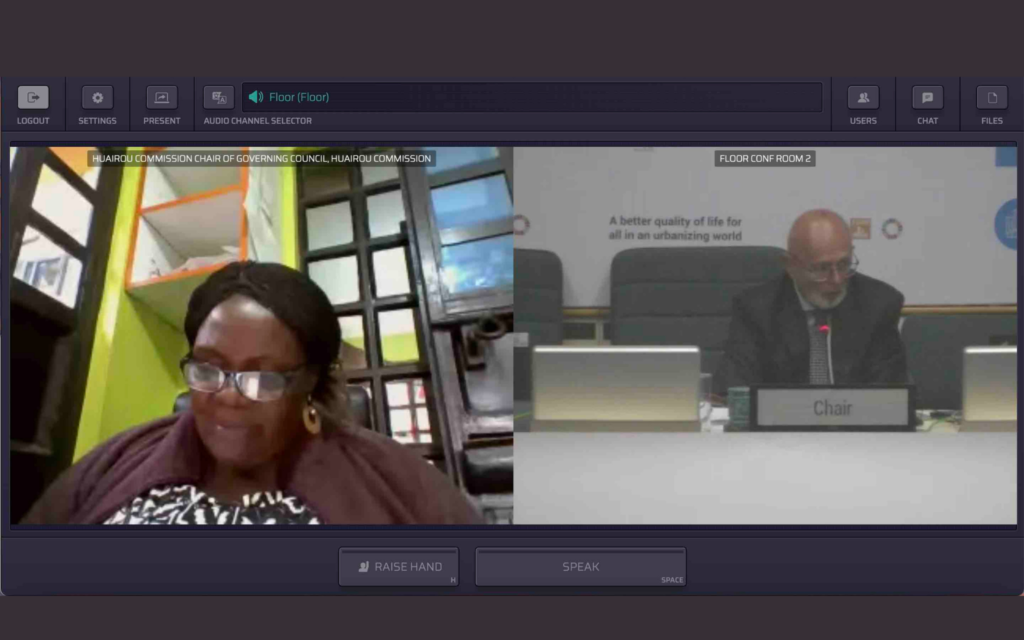Huairou Commission’s Oral Statement at the First Session of UN-Habitat Executive Board 2022

The Executive Board of UN-Habitat held its first session for the year 2022 for three days from 29 to 31 March 2022.
Violet Shivutse, the Chair of Huairou Commission’s Governing Council and Founder-Director of Shibuye Community Health Workers, Kenya delivered an oral statement on behalf of the Huairou Commission at this Executive Board session, representing Huairou’s global grassroots women’s constituency. She highlighted the critical need to recognize the contributions, leadership and roles of women and grassroots organizations in achieving progress towards safer and resilient cities and communities. Violet also recommended enhanced investment in engagement and partnership with organised grassroots and women groups as key elements to advance gender-responsive governance and accelerate the implementation of the New Urban Agenda to achieve the SDGs.
Read the full statement below.
Statement at The First Session of 2022 Executive Board
The United Nations Human Settlements Programme (UN-Habitat)
29 – 31 March 2022
Delivered by Violet Shivutse, Huairou Commission Governing Council Chair

Honorable Chair, Excellencies, Madam ED and from other partner constituencies,
Good morning/afternoon
Firstly, thank you for this opportunity to provide our inputs and points at this 1st session of the 2022 Executive Board Meeting of UN-Habitat.
I represent the Huairou Commission, a global movement of grassroots women’s organizations supporting women in 42 countries leading a transformative agenda for inclusive resilience and gender justice. Our member groups are building the leadership capacity of grassroots women, enhancing the resilience of their communities, and advocating for change in the systems that govern local and global development. We started in 1995 with our participation in the preparatory process of the Habitat II Conference, and continue as a strong partner of UN-Habitat, we bring the constituency of women with a focus on organised grassroots groups.
We appreciate the continued work of UN-Habitat under the leadership of the Executive Director and her dedicated team in implementing its commitments in these difficult and trying times since March 2020.
As set out in the UN Secretary-General Policy Brief on COVID-19 in an Urban World, and further elaborated upon in UN-Habitat’s Cities and Pandemics Report, the pandemic exposed systemic inequalities and created new vulnerabilities that has been deemed to regress many advances made in meeting the SDGs. We take note of UN-Habitat’s catalytic role as a knowledge hub and partner convenor, and hence recommend it to enhance and invest in its engagement and partnership with organised grassroots and women groups as key elements to advance gender-responsive governance and accelerate the implementation of the New Urban Agenda to achieve the SDGs.
Women, especially those living in informal settlements, working in informal economies, and those displaced and at risk of multiple threats- are working against huge challenges to survive for their families and communities. The Covid-19 pandemic and the responses such as government lockdowns have highlighted and exacerbated many of the chronic stresses urban poor communities live with and struggle against daily. Many reports and policy briefs have highlighted women are already disproportionately affected by poverty, discrimination, climate change, and now pandemics; but we must also recognised they, especially the organised women-led grassroots groups, are already partners and resilient leaders in the creation of green, just, sustainable, and prosperous cities.
Effective solutions to ‘building back better’ need to be about more than Covid-19 response and recovery: they must address the need for sustainable, inclusive, and pro-poor urban development that provides communities with meaningful opportunities to work with government and other stakeholders to address issues such as secure tenure, housing, food security, livelihood opportunities, and basic services, as well as the need for accurate community data to drive timely and effective government responses.
Over many decades, women’s groups and organized grassroots communities have shown that they have the social networks and systems in place to respond efficiently and effectively to disasters and chronic stressors. They have demonstrated their critical role to governments and development partners as reliable actors at the forefront of provision of information on and services to the most affected during crisis or disaster, as well as in the process of recovery. Organised grassroots groups have the information, knowledge, and skills to work with government and other stakeholders to implement effective, scalable solutions to chronic and acute urban challenges. It is critical to recognise their contributions, leadership and roles of women and grassroots organizations addressing both practical and strategic priorities towards safer and resilience cities and communities so we are on track to achieve the SDGs.
Once again, we call on Member States to invest and resource UN-Habitat to lead in the development and implementation of gender responsive urban policies as well institutionalisations of its partnerships with organised grassroots groups as key transformative instruments for the Agency to carry out its normative and operational activities in the remaining period of the current strategic plan 2020-23 and as we chart the path to advance the implementation of the New Urban Agenda. We deem this is also a way to put into practice Resolution 1/4 , “achieving gender equality through the work of the United Nations Human Settlements Programme to support inclusive, safe, resilient and sustainable cities and human Settlements”.
Finally, we look forward to leading the grassroots and women’s input in the High-Level Meeting of the General Assembly on the implementation of the New Urban Agenda on 28 April 2022, as well as co-planning of and participating actively in the 11th Session of the World Urban Forum.
We remain committed to continue and strengthen partnership with UN-Habitat.
Thank you.
